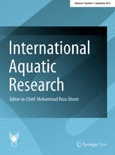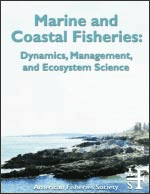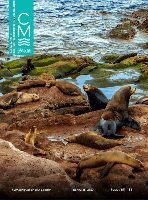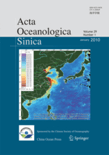
REVMAR-Revista Ciencias Marinas y Costeras
Scope & Guideline
Empowering voices in marine and coastal sciences.
Introduction
Aims and Scopes
- Marine Biodiversity Studies:
The journal frequently publishes studies on the identification and characterization of marine species, including new records and ecological assessments of various marine organisms. - Ecological Dynamics and Interactions:
Research focusing on the ecological interactions within marine communities, such as predation, community structure, and species segregation, is a core area of the journal's focus. - Impact of Environmental Stressors:
The journal addresses the effects of pollutants and environmental changes on marine organisms, including the influence of xenobiotics on marine bacteria and the ecological implications of microplastic pollution. - Marine Resource Management:
There is a consistent emphasis on sustainable management practices, with studies on marine spatial planning, fisheries dynamics, and the management of harmful algal blooms. - Geographic Information Systems (GIS) Applications:
Utilization of GIS for marine research and planning is a notable methodological approach, reflecting the journal's commitment to integrating technology in marine sciences.
Trending and Emerging
- Effects of Climate Change on Marine Ecosystems:
There is a growing emphasis on understanding how climate change affects marine biodiversity and ecosystem dynamics, reflecting global concerns about environmental changes and their implications for marine life. - Microbial Ecology and Environmental Stressors:
Research on the effects of pollutants, such as microplastics and heavy metals, on marine microorganisms is gaining traction, highlighting the importance of microbial communities in ecosystem health. - Technological Integration in Marine Research:
The use of GIS and advanced data analytics in marine research is increasingly prevalent, indicating a trend toward employing modern technologies for better management and understanding of marine environments. - Conservation and Restoration Efforts:
There is an emerging focus on studies related to conservation practices and restoration of marine habitats, reflecting a broader trend towards addressing ecological degradation and promoting sustainability.
Declining or Waning
- Historical Data Analysis:
Research that relies heavily on historical data, such as long-term sightings or records, seems to be less frequent. This may reflect a shift towards more immediate ecological assessments and experimental studies. - Traditional Fishing Practices:
Studies specifically focused on traditional or artisanal fishing practices are less commonly published, possibly indicating a broader focus on ecological impacts and sustainability rather than the practices themselves. - In-depth Taxonomic Studies:
While taxonomic studies are still present, there appears to be a decrease in the number of papers dedicated solely to detailed taxonomic descriptions or classifications, suggesting a shift towards broader ecological or environmental research.
Similar Journals

International Aquatic Research
Fostering collaboration in the realm of aquatic research.International Aquatic Research, published by the Islamic Azad University, Tonekabon Branch, is a vital open-access journal dedicated to advancing the field of aquatic sciences since its inception in 2009. With an ISSN of 2008-4935 and an E-ISSN of 2008-6970, the journal plays a significant role in disseminating high-quality research findings from Iran and around the globe. It covers a broad range of topics in aquatic biology, fisheries science, and marine ecology, making it a valuable resource for researchers, professionals, and students alike. As of 2023, it ranks in the third quartile (Q3) of the aquatic science category with a Scopus rank of #138 out of 247 in Agricultural and Biological Sciences, reflecting its growing influence in the field. With a commitment to promoting scientific knowledge and fostering collaboration among aquatic research communities, International Aquatic Research is positioned as an essential platform for those dedicated to understanding and conserving marine and freshwater environments.

ACTA ADRIATICA
Connecting ocean scientists for a sustainable future.ACTA ADRIATICA is a distinguished journal dedicated to the field of oceanography, published by the renowned INST OCEANOGRAFIJU I RIBARSTVO in Croatia. With its ISSN 0001-5113 and E-ISSN 1846-0453, this journal offers a rigorous platform for researchers and practitioners to explore and disseminate critical studies related to the Adriatic Sea and broader marine environments. Despite its categorization in Q4 of Oceanography and a current rank of #98/145 in the Scopus database, ACTA ADRIATICA remains a vital source of knowledge, fostering collaboration and innovation among ocean scientists. The journal invites submissions that contribute to understanding marine ecosystems, biodiversity, and the impacts of climate change, making it an essential resource for advancing research in this ever-evolving discipline. With a publication history extending back to 1973, ACTA ADRIATICA continues to uphold its commitment to enhancing oceanographic literature while promoting open dialogue within the scientific community.

THALASSAS
Exploring the Depths of Aquatic KnowledgeTHALASSAS is a prominent academic journal specializing in the fields of Aquatic Science and Oceanography, published by Springer International Publishing AG. Established in 2005 and running through 2024, this journal serves as a vital platform for sharing groundbreaking research and innovative findings related to the marine environment and its ecosystems. With an ISSN of 0212-5919 and an E-ISSN of 2366-1674, THALASSAS is indexed in Scopus and currently holds a Q3 classification in both Aquatic Science and Oceanography for 2023, reflecting its relevance and contribution to these scientific disciplines. Although it does not follow an Open Access model, THALASSAS offers valuable insights for researchers, professionals, and students interested in sustainable ocean management and aquatic biodiversity. Its rigorous peer-review process ensures that published articles meet the highest standards of academic quality, fostering a deeper understanding of marine sciences and addressing critical issues facing aquatic systems today.

Journal of Oceanology and Limnology
Unveiling the Mysteries of Water WorldsJournal of Oceanology and Limnology, published by SCIENCE PRESS, is a premier academic journal dedicated to advancing the fields of oceanography and limnology. With an ISSN of 2096-5508 and E-ISSN 2523-3521, this journal has emerged as a vital resource since its inception, aiming to disseminate cutting-edge research and comprehensive studies on aquatic environments. Based in China and indexed with notable rankings in Scopus, including a Q2 category in Oceanography and a Q3 category in Water Science and Technology, this journal significantly contributes to knowledge in these crucial scientific disciplines. The H-index for the journal is currently being established, reflecting its evolving impact within the academic community. Moreover, the open access model promotes wider dissemination, ensuring that research findings are accessible to a global audience. Covering a diverse range of topics from ecosystem health to climate impact on water bodies, the Journal of Oceanology and Limnology aspires to foster interdisciplinary dialogue and innovation among researchers, professionals, and students engaged in understanding and preserving aquatic life.

BULLETIN OF MARINE SCIENCE
Charting new waters in oceanographic scholarship.BULLETIN OF MARINE SCIENCE, published by Rosenstiel School of Marine and Atmospheric Science, is a prominent journal dedicated to advancing the field of marine science through scholarly research and peer-reviewed articles. With an ISSN of 0007-4977 and an E-ISSN of 1553-6955, this journal has been contributing to significant scientific discourse since its inception in 1973. Covering a wide spectrum of topics in aquatic sciences and oceanography, it has maintained a respectable position in the academic community, as evidenced by its Q3 ranking in both categories for 2023. Although currently not an open-access journal, it provides essential access to groundbreaking research that informs marine conservation, ecological studies, and atmospheric sciences. Situated in the United States at 4600 Rickenbacker Causeway, Miami, FL 33149, the journal serves as a vital resource for researchers, professionals, and students seeking to engage with the latest findings in marine science and foster a deeper understanding of our oceans.

Marine and Coastal Fisheries
Navigating contemporary challenges in aquatic ecosystems.Marine and Coastal Fisheries, published by Wiley, is a leading open access journal that has been dedicated to advancing the field of fisheries science since its inception in 2009. With an esteemed Q1 ranking in Aquatic Science and a Q2 ranking in Ecology, Evolution, Behavior and Systematics as of 2023, the journal actively contributes to the understanding and management of marine and coastal ecosystems.
This journal serves a diverse audience ranging from researchers and practitioners to students, providing a platform for high-quality peer-reviewed articles that address contemporary challenges in fisheries management and conservation. With a commitment to global accessibility, Marine and Coastal Fisheries promotes the dissemination of scientific knowledge to enhance sustainable practices in marine environments, making it an essential resource for those invested in the health of aquatic ecosystems. To explore the latest research and insights, visit the journal's website and engage with the thriving community of marine science professionals.

CIENCIAS MARINAS
Advancing Marine Science Through Open AccessCIENCIAS MARINAS, an influential journal in the field of Aquatic Sciences, is published by the Instituto de Investigaciones Oceanológicas of the Universidad Autónoma de Baja California. Established as an open access platform since 2006, it aims to disseminate original research and critical reviews that contribute to the advancement of marine science. With a commitment to fostering scholarly dialogue, CIENCIAS MARINAS serves as a vital resource for academics, researchers, and practitioners interested in the ecological dynamics and biological processes of aquatic environments. Although currently ranked in the fourth quartile in Aquatic Science by Scopus, the journal remains dedicated to increasing its visibility and impact within the research community. Housed in Mexico, it offers a regional perspective that underscores the importance of coastal and oceanic research, making it an essential avenue for exploring marine biodiversity and conservation efforts. By engaging with this journal, readers can stay abreast of the latest developments and contribute to the growing body of knowledge in marine sciences.

ACTA OCEANOLOGICA SINICA
Illuminating the Complexities of Aquatic EnvironmentsACTA OCEANOLOGICA SINICA, published by SPRINGER, stands as a significant voice in the fields of Aquatic Science and Oceanography, contributing vital research and insights since its inception in 1985. With an ISSN of 0253-505X and an E-ISSN of 1869-1099, this journal maintains a strong international focus, delivering high-quality peer-reviewed articles that address pressing marine and freshwater environmental issues. Although it operates under a subscription model, its Q3 ranking in both Aquatic Science and Oceanography demonstrates its solid standing within Scopus, placing it in the 48th and 44th percentiles respectively. The journal aims to foster knowledge exchange and collaboration among researchers, professionals, and students by providing a platform for innovative studies and comprehensive reviews. With a dedicated editorial board and a commitment to advancing scientific understanding, ACTA OCEANOLOGICA SINICA serves as an essential resource for anyone engaged in the study of oceanographic phenomena and aquatic ecosystems.

GULF AND CARIBBEAN RESEARCH
Innovating Conservation Strategies for Vital Aquatic RegionsGulf and Caribbean Research is an esteemed academic journal published by the University of Southern Mississippi, dedicated to advancing the understanding of aquatic ecosystems in the Gulf of Mexico and the Caribbean region. With an ISSN of 1528-0470 and an E-ISSN of 2572-1410, the journal serves as an essential platform for researchers and professionals in the fields of Aquatic Science, Oceanography, and Water Science and Technology, recognized in the 2023 Q3 Quartile rankings across these disciplines. The journal welcomes diverse contributions including original research, reviews, and technical notes, encouraging interdisciplinary approaches to address ecological and environmental challenges within its scope. Despite the absence of an open access option, it provides invaluable insights, evidenced by its Scopus rankings, which position it within the 31st to 33rd percentile across various related categories. The engaging research articulated in Gulf and Caribbean Research fosters dialogue and collaboration, making it a vital resource for those committed to scientific discovery and conservation efforts in these critical aquatic environments.

REVISTA DE BIOLOGIA MARINA Y OCEANOGRAFIA
Empowering Marine Science Through ResearchREVISTA DE BIOLOGIA MARINA Y OCEANOGRAFIA is a prominent academic journal dedicated to the fields of marine biology and oceanography, published by the Faculty of Marine Sciences and Natural Resources at Universidad de Valparaíso, Chile. Since its inception in 1996, this journal has been a vital platform for disseminating research findings and advancements in aquatic sciences, covering a breadth of topics relevant to the marine environment. With its current impact positioned within the Q4 quartile of both Aquatic Science and Oceanography categories in 2023, the journal serves as an essential resource for scholars, practitioners, and students alike, aiming to enhance their understanding of marine ecosystems. While the journal does not provide open access options, it continues to contribute valuable insights, helping to foster a deeper appreciation for oceanographic science and marine biodiversity. Located in the scenic city of Viña del Mar, Chile, this publication invites manuscripts that push the boundaries of knowledge and stimulate discourse within the marine sciences community, thereby promoting sustainable management and conservation of oceanic resources.